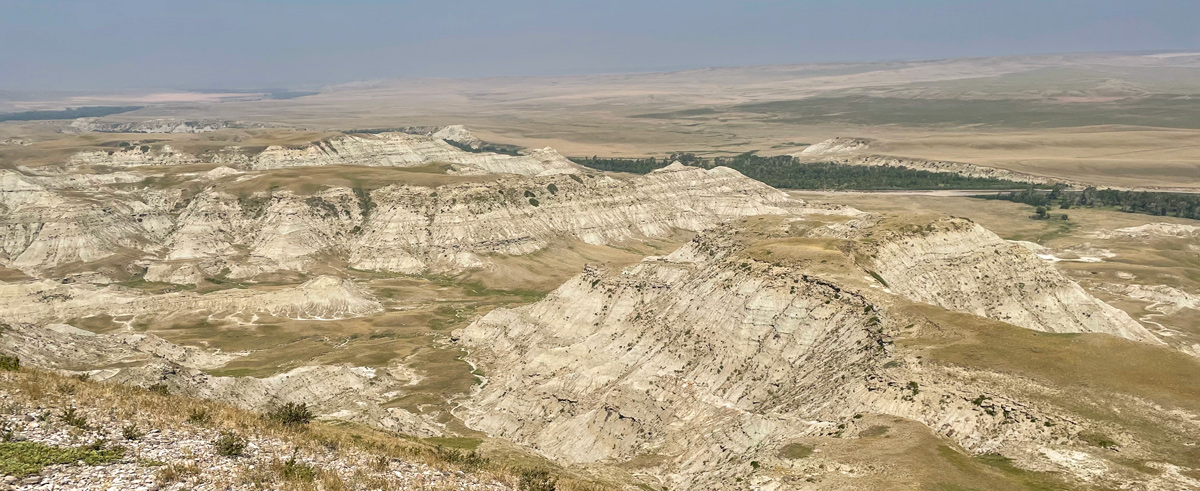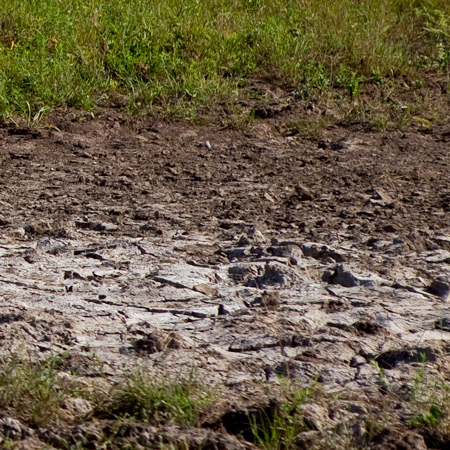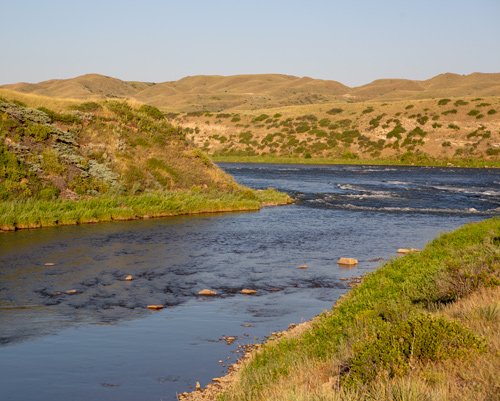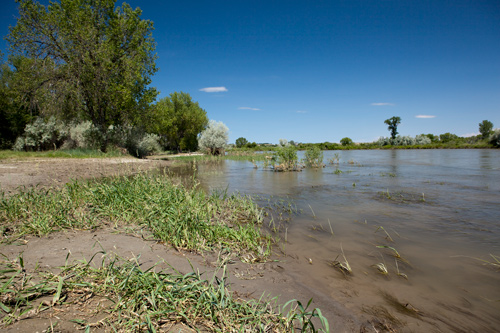Lewis and his small group leave Camp Disappointment and head south. At the Two Medicine River, they are joined by a group of young Blackfeet and an uncomfortable and wary night ensues.
On their way to the Knife River Villages, Sgt. Pryor and his small group wake to find that all of their horses have been stolen. They pursue the culprits’ tracks for ten miles before giving up. Later during the night, a wolf bites Pryor’s hand.
At the Great Falls of the Missouri, the men move the last dugout canoe on a muddy portage route. All the dugouts are taken down present Belt Creek and then to the cache and white pirogue at Lower Portage Camp.
Clark and his group move quickly down the swift Yellowstone River. Clark and Pvt. Labiche explore seven miles up the Bighorn River.[1]For more on the captains’ strategy and various groups after leaving Travelers’ Rest, see Dividing Forces at Travelers’ Rest.
Lewis Concerned
by Yellowstone Public Radio[2]Originally aired weekdays by Yellowstone Public Radio during the Bicentennial observance of 2003-2006. Narrated by Hal Hansen. Scripts by Whit Hansen and Ed Jacobson. Produced by Leni Holliman. © … Continue reading
Lewis Encounters Blackfeet
Two Medicine Fight Site
© 16 July 2021 by Kristopher K. Townsend. Permission to use granted under the Creative Commons Attribution-Share Alike 4.0 International license.
Above: The expansive views along the Two Medicine River are showcased at the expense of showing the river and fight site camp which was likely near the lone cottonwood tree center right. Behind that tree and in front of the larger cottonwood bottom, the river flows left to right.
Leaving Camp Disappointment
we set out biding a lasting adieu to this place which I now call camp disappointment. I took my rout through the open plains S. E.
—Meriwether Lewis
Cautious Approach
when we arrived within a hundred yards of each other the indians except one halted I directed the two men with me to do the same and advanced singly to meet the indian with whom I shook hands and passed on to those in his rear, as he did also to the two men in my rear; we now all assembled and alighted from our horses; the Indians soon asked to smoke with us
—Meriwether Lewis
Indian Gifts
I thought it best to please them and gave to one a medal to a second a flag and to the third a handkercheif, with which they appeared well satisfyed.
—Meriwether Lewis
A Blackfeet Interview
indians formed a large simicircular camp of dressed buffaloe skins and invited us to partake of their shelter which Drewyer and myself accepted and the Fieldses [R. Field and J. Field] lay near the fire in front of the sheter. with the assistance of Drewyer I had much conversation with these people in the course of the evening.
—Meriwether Lewis
Nearest Trading Post
they also informed us that from hence to the establishment where they trade on the Suskasawan river is only 6 days easy march or such as they usually travel with their women and childred which may be estimated at about 150 ms. that from these traders they obtain arm amunition sperituous liquor blankets &c in exchange for wolves and some beaver skins.
—Meriwether Lewis
An Unwanted Peace
I told these people that I had come a great way from the East up the large river which runs towards the rising sun, that I had been to the great waters where the sun sets and had seen a great many nations all of whom I had invited to come and trade with me on the rivers on this side of the mountains, that I had found most of them at war with their neighbours and had succeeded in restoring peace among them
—Meriwether Lewis
A Wary Night
I took the first watch tonight and set up untill half after eleven; the indians by this time were all asleep, I roused up R. Fields and laid down myself; I directed Fields to watch the movements of the indians and if any of them left the camp to awake us all as I apprehended they would attampt to seal [steal] our horses. this being done I fell into a profound sleep and did not wake untill the noise of the men and indians awoke me a little after light in the morning.—
—Meriwether Lewis
Weather Diary (Lewis)
State of the weather at rise
Wind at rise
State of the weather at 4 P. M. Wind at 4 P. M. cloudy after rain N fair N W wind violent rain continues.
—Meriwether Lewis
Nothing but Horse Tracks
© 2011 by Kristopher K. Townsend. Permission to use granted under the Creative Commons Attribution-Share Alike 4.0 International license.
Pryor’s Horses Stolen
Chasing Stolen Horses
In the morning he [Pryor] could See no horses. in lookg about their Camp they discovered Several tracks within 100 paces of their Camp, which they pursued found where they had Caught and drove off all the horses. they prosued on five miles the Indians there divided into two parties. they Continued in pursute of the largest party five miles further finding that there was not the Smallest Chance of overtakeing them, they returned to their Camp . . . .
—William Clark (recorded 8 August 1806)[3]Sgt. Pryor was instructed to keep a journal, but no entries are known to exist. In Clark’s summary of Pryor’s trip, we can’t be certain that they camped again on Fly Creek, but it … Continue reading
Wolf Bite
on the night of the 26th ulto: the night after the horses had been stolen a Wolf bit Sergt. Pryor through his hand when asleep, and this animal was So vicious as to make an attempt to Seize Windsor, when Shannon fortunately Shot him.
—William Clark (recorded 8 August 1806)
Finishing the Portage (Gass and Ordway)
Belt Creek Enters the Missouri River
© 30 June 2015 by Kristopher K. Townsend. Permission to use granted under the Creative Commons Attribution-Share Alike 4.0 International license.
Running the Canoes
the portage River too high to waid but is falling fast. Colter & Potts went at running the canoes down the rapids to the white perogue near the carsh.
—John Ordway
Portaging the Last Canoe
the rest of us returned to willow Creek took on the other large canoe and halted to asist the horses as the truck wheels Sank in the mud nearly to the hub.
—John Ordway
The Final Stage
Cruzatte killed a buffaloe we took the best of the meat and returned with much hard fatigue to portage River and got the canoes and all the baggage down to the white perogue and Camped having got the carsh opened and all brought to the White perogue & all Safe &C.
—John Ordway
Mouth of the Bighorn
© 27 July 2011 by Kristopher K. Townsend. Permission to use granted under the Creative Commons Attribution-Share Alike 4.0 International license.
Clark Explores the Bighorn
Swift Yellowstone River
Set out this morning very early proceeded on Passed Creeks very well. the Current of the river reagulilarly Swift much divided by Stoney islands and bars also handsome Islands Covered with Cotton wood
—William Clark
Bighorn River Excursion
I with one of my men Labeech [Labiche] walked up the N E Side of Big horn river 7 miles . . . . The bottoms of the Big Horn river are extencive and Covered with timber principally Cotton . . . . Buffalow, Elk, Deer and Antelopes [Pronghorns] are plenty and the river is Said to abound in beaver.
—William Clark
Too Tired to Eat
I returned to Camp a little after dark, haveing killed one deer, finding my Self fatigued went to bead without my Supper. Shields killed 2 Bull & 3 Elk.
—William Clark
Weather Diary (Clark)
State of the weather at Sun rise Wind at Sun rise State of the weather at 4 P. M Wind at 4 P M. cloudy S S W fair after rain N W. a Slight Shower this morning with hard wind from the S. W. The river falling, but very Slowly 1 inch in 24 hs.
—William Clark[4]To assist the reader of this web page, the date column is omitted and some abbreviations have been spelled out.
Experience the Lewis and Clark Trail
The Lewis and Clark Trail Experience—our sister site at lewisandclark.travel—connects the world to people and places on the Lewis and Clark Trail.
Plan a trip related to July 26, 1806:
- Two Medicine River Interpretive Site (Lewis)
- Billings to Yellowstone Confluence Driving Tour (Clark)
- Knife River Indian Villages (Pryor)
- Lower Portage Staging Area (Gass and Ordway)

Camp Disappointment is a High Potential Historic Site along the Lewis and Clark National Historic Trail managed by the U.S. National Park Service. The site is on private property within the Blackfeet Indian Reservation.
Two Medicine Fight Site is a High Potential Historic Site along the Lewis and Clark National Historic Trail managed by the U.S. National Park Service. The site is on private property.
The Great Falls Portage is a High Potential Historic Site along the Lewis and Clark National Historic Trail managed by the U.S. National Park Service. It includes Sulphur Springs (open to the public) and Lower Portage camp site (private land), and the Upper Portage Camp Overlook.
Notes
| ↑1 | For more on the captains’ strategy and various groups after leaving Travelers’ Rest, see Dividing Forces at Travelers’ Rest. |
|---|---|
| ↑2 | Originally aired weekdays by Yellowstone Public Radio during the Bicentennial observance of 2003-2006. Narrated by Hal Hansen. Scripts by Whit Hansen and Ed Jacobson. Produced by Leni Holliman. © 2003 by Yellowstone Public Radio. |
| ↑3 | Sgt. Pryor was instructed to keep a journal, but no entries are known to exist. In Clark’s summary of Pryor’s trip, we can’t be certain that they camped again on Fly Creek, but it is the most likely scenario. When they returned to that camp, they had traveled twenty miles by foot and would still need to transfer their baggage from horse packs to backpacks before continuing. |
| ↑4 | To assist the reader of this web page, the date column is omitted and some abbreviations have been spelled out. |






